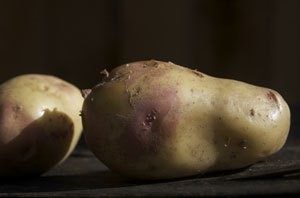British Columbia
B.C. farmers growing 'outlawed' potatoes are looking for new partners
Cariboo potatoes 'decertified' by federal authorities in the 1970s, making them illegal to grow commercially
Jordan Tucker, Akshay Kulkarni · CBC News · Posted: Dec 07, 2023 8:00 AM EST | Last Updated: December 7, 2023
The Cariboo potato is not allowed to be grown for commercial use. Federal authorities have threatened the small Horse Lake Community Farm Co-Op, located 115 kilometres north of Kamloops, with a $10,000 fine. (Submitted by the Horse Lake Community Farm Co-Op)
Social Sharing
A B.C. farmer that grows an outlawed breed of potato says it is important to preserve the hardy breed, even if they aren't suitable for large-scale commercial production.
Rob Diether, 70, specializes in growing potatoes at the Horse Lake Community Farm Co-Op, located 115 kilometres north of Kamloops.
Inside a root cellar at the farm, Diether holds up one of the potatoes that has made the organic farm famous around the country. The Cariboo potato has a yellow skin and what he describes as "beautiful pink blotches" on it.
"These are very special potatoes. They're hiding in the back to keep them away from just anyone who might not know how special they are," he tells CBC News.
Rob Diether, 70, holds up two Cariboo potatoes in his hand at the co-op farm he helped form nearly two decades ago. Cariboo potatoes are not allowed to be grown in a commercial fashion — but Diether says the fact his farm continues to grow them reflects a need to continue sustainable farming practices. (Jordan Tucker/CBC)
"They look so attractive and the flesh is quite yellow as well. They're a lovely potato. We've been growing and saving this seed since the mid-'70s."
The reason for the Cariboo's fame is that it's illegal. The Cariboo is not allowed to be grown for commercial use and federal authorities have threatened the small co-op with a $10,000 fine.
And yet, the spud has been grown for decades on the farm, and Diether says efforts to preserve a potato long decertified by authorities reflects a need to practise sustainable small-scale farming.
The spuds have sparked interest from as far away as Corner Brook, N.L., and the farm regularly receives correspondence from those wanting to taste the tuber.
CBC associate producer Jordan Tucker and Rob Diether stand outside the root cellar on the Horse Lake Community Farm Co-Op. (CBC)
"'Enclosed: Find $2 to cover expenses for some of your great nurturing efforts and perseverance in dealing with government agricultural departments,'" Diether says, reading out from a stack of dozens of letters.
"That's from somebody … in Calgary."
Diether says the interest in their "outlawed" potatoes may signal a growing interest in farming, and he hopes new farmers join the co-op to continue sustainable farming for generations to come.
"The main idea is … to preserve this unique piece of farmland and see that it does remain in farm production," he told CBC News. "It isn't just sold or subdivided or just becomes an estate for somebody. That's why people belong to the co-op."
The farmer says he thinks it's "quite absurd" that the potatoes had been deregistered given their suitability for small farmers.
Radio West8:28CBC associate producer Jordan Tucker checks out the Horse Lake Farm Co-op, located near Highway 24, who are working to keep an "illegal" potato alive
CBC associate producer Jordan Tucker checks out the Horse Lake Farm Co-op, located near Highway 24, who are working to keep an "illegal" potato alive.
How a potato becomes decertified
The B.C. Food History blog, which is run by a group of university lecturers, says the Cariboo potato was developed by the federal Potato Research Centre in Fredericton, N.B., and did "unusually well" in the B.C. Interior's tough climate during the 1960s and '70s.However, Diether says that, despite the potato's hardy nature, its thick vines and feathery foliage made it unsuitable for mechanical harvesting, as the vines would tangle with machine pickers.
He added the Cariboo potato was also sensitive to sunlight, which would make the spuds go green if they were sitting on a supermarket shelf for long.
A 1993 clipping from the Vancouver Sun depicts CEEDS founder Jerry LeBourdais and his quest to preserve the Cariboo potato. (Submitted by Rob Diether)
The blog says the potato was "decertified" by Agriculture and Agri-Food Canada (AAFC) in 1976, which meant that commercial potato seed growers would lose their licence if they continued to grow them.
AAFC says the Cariboo potato was first registered in 1967, and its registration status is currently listed as "cancelled."
Crops can be decertified by federal authorities to prevent disease and unregulated growing, though Diether contends there was no risk of disease in the case of the Cariboo potato.
CBC News reached out to AAFC, but did not hear back in time for publication.
Diether says despite the threat of a fine, AAFC had "declared a truce" with the farm that has held for decades.
Search for more co-op farmers
Diether says it was not uncommon for AAFC to replace potato varieties with others that they feel were improved.The farmer has been working in the fields since the mid-'70s, when he joined the Community Enhancement and Economic Development Society (CEEDS), which he describes as a "back to the land agricultural commune."
He says they first obtained Cariboo potato seeds in the early '80s, when an old farmer called Tommy Wint got his hands on four seeds "by hook or by crook" for the enterprising commune members.
The Horse Lake Co-Op is spread across nearly 54 hectares of land north of Kamloops. It is supported by a number of people who have bought shares in order to preserve the land as farmland. Potatoes are only grown on a small portion of the property. (Jordan Tucker/CBC)
Since then, CEEDS, which helped get the Horse Lake co-op started in 2006, has grown a veritable bounty of Cariboo potatoes from those first four seeds. Tonnes of other varieties of potatoes are also grown on around a half-acre (0.2 hectares) of land at the farm.
Diether says that, of late, many people have come up to him at farmers' markets to ask him for advice on how to grow plants in small containers and gardens — something he says reflects people's growing interest in planting their own food.
- Gen Z and millennial Canadians are really digging gardening right now
- Sales of veggie seeds way up, as more people aim to grow their own food in pandemic
ABOUT THE AUTHOR
Jordan Tucker
Last edited:



 .
.